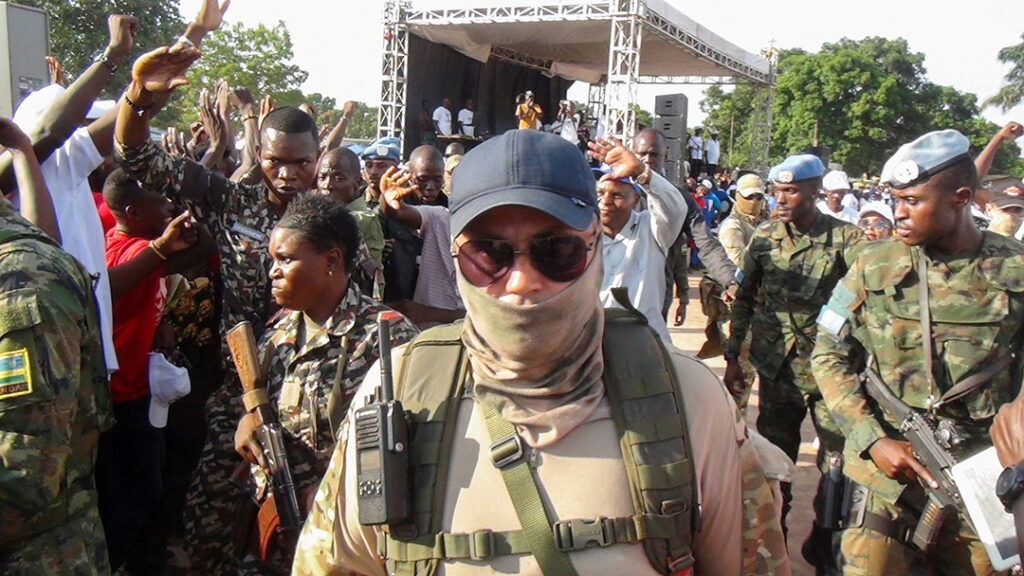ADF STAFF
There was no surprise when military junta leaders in Niger reached out to Russia’s mercenary Wagner Group for help just days after overthrowing a democratically elected government and suspending the country’s constitution.
Experts say Russia’s presence in Africa is focused on promoting autocracy and instability.
Niger is simply the latest example.
“War is a business, and it’s a business Russia has managed to do very well in,” said Marisa Lourenço, a South Africa-based independent political and economic risk analyst, during an August 14 panel discussion called The Resistance Bureau.
“This is effectively what drives Russia. Africa keeps it busy.”
For two decades, Russia has employed a strategy of enabling and protecting authoritarian regimes while undermining democracy in every region in Africa.
Joseph Siegle, director of research at the Africa Center for Strategic Studies (ACSS), called it a “counter revolutionary” strategy in which authoritarian regimes avert government checks and balances to benefit themselves politically and financially.
“This is akin to guarding the door while a violent crime takes place inside,” Siegle wrote in a February book review on the Democracy in Africa website.
“This is coupled with Russia’s highly sophisticated disinformation campaigns infused with Orwellian messaging on non-interference and African empowerment.”
Siegle traces the roots of Russia’s strategy in Africa to the winter of 2011-12, when protests against President Vladimir Putin swept through large cities such as Moscow and fueled Putin’s paranoia and determination to quash any opposition voices.
At the same time, the Arab Spring uprisings spread through North Africa.
“Putin fears that popular demands for democracy pose a direct threat to his own president-for-life ambitions,” Siegle wrote. “These fears were stoked with the Arab Spring protests in North Africa that saw the overthrow of Zine Abedine Ben Ali in Tunisia, Hosni Mubarak in Egypt, and Muammar al-Gaddafi in Libya in 2011.”
Russia has sought to weaken and stifle freedom and democratic representation across the continent ever since.
In a recent infographic, the ACSS highlighted Russia’s systematic efforts to derail democratic development in more than a dozen African countries, including:
- Burkina Faso: Russia endorsed two military coups, both of which followed coordinated Russian disinformation campaigns with dozens of Russian-sponsored social media accounts promoting pro-Russian, pro-junta and pro-Wagner narratives.
- Central African Republic: Russia has effectively captured the government of President Faustin-Archange Touadéra, with Russian and Wagner operatives occupying the roles of presidential guard, national security advisor and senior advisors in the finance and customs ministries. Russia interfered heavily in the 2020 election and is working to keep Touadéra in power beyond his term limits. While extracting the country’s diamonds and gold, Wagner fighters have been accused of massacres, torture, rape and other human rights abuses against civilians.
- Libya: Russia has deployed Wagner Group mercenaries, launched air strikes and unleashed a massive disinformation effort to support Khalifa Haftar’s attempt to install himself as the country’s new strongman.
- Mali: Amidst highly organized disinformation campaigns promoting the military junta and denigrating the effectiveness of democracy, at least 1,000 Wagner fighters have deployed and are accused by international bodies of committing atrocities and human rights abuses against civilians.
- Sudan: Russia deployed Wagner fighters to Sudan in late 2017 to prop up dictator Omar al-Bashir. After his ouster, Russia derailed the planned democratic transition and supported the military coup led by Gen. Abdel Fattah al-Burhan in 2021.
Russia also supported extra constitutional extensions of power in Burundi, the Democratic Republic of the Congo, the Republic of the Congo and Rwanda.
The ACSS report found that 11 of the 23 African countries where Russia is working to undermine democracy are in conflict.
Turning back to the Niger junta, Lourenço noted that the coup did not emerge from the needs of the Nigerien people. It was an opportunistic power grab in a region known for instability, which explains Russia’s growing presence in the Sahel.
“What is most concerning about all the coups we have seen for the past three years is that these are not actually popular uprisings,” she said in a July 31 interview with Al Jazeera TV.
“They’re not actually looking for a better future.”
In his book, “Russia in Africa: Resurgent Great Power or Bellicose Pretender?” Samuel Ramani cites annual surveys by Pew Research Global Attitudes in Africa, which found that Russia and Putin are extremely unpopular, with favorability ratings rarely exceeding 33% of Africans.
Siegle says Russia’s unpopularity means its strategy to thwart democracy can only be executed with the help of those in power.
“It relies on elite collusion. Meanwhile, it generates deep resentment toward Moscow by Africans aspiring for freedom,” he wrote.

